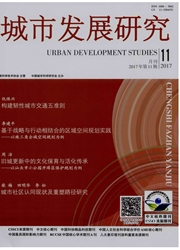

 中文摘要:
中文摘要:
电子商务的快速发展不仅对城市的产业结构产生了巨大的影响,也因此驱动了城市的土地利用结构变化。在理论探讨电子商务(主要包括网商、网购两方面)发展对城市商服用地变化的影响机理基础上,通过构建计量经济模型,利用2014年全国285个地级市的相关统计数据,实证检验了中国电子商务发展对城市商服用地规模变化的具体影响。结果显示,电子商务的快速发展总体会在一定程度上促使城市商服用地规模的减少。具体地,一方面,尽管网商在发展初期会增加对商服用地的需求,但随着发展到一定阶段,其会促使商服用地规模的减少,因此网商发展对城市商服用地的影响呈倒"U"型变化规律;另一方面,网购规模的扩大对城市商服用地规模的影响总体也表现为先促进后抑制的倒"U"型规律,且全国已有部分城市的商服用地在网购发展的影响下已经呈现下降趋势。最后从优化城市商服用地配置,促进电子商务有序发展的角度提出了相关政策建议。
 英文摘要:
英文摘要:
The rapid development of e-commerce not only has a huge impact on the urban industrial structure but also drives the change in urban land use structure. Based on the theoretical discussion of how the urban commercial land use scale responds to the development of e-commerce, including network operator and online shopping, we constructed an econometric model to test the impacts of e-commerce on urban commercial land use scale by using the statistics of 285 prefecture-level cities all over China in 2014. The results show that the rapid development of e-commerce leads to a certain degree of reduction in urban commercial land use. Although the commercial land use scale expands at the early stage due to the increased demand of network operators, it then decreases with the continuous development of e-commerce, leading to a reverse-U shaped trend. Similarly, the commercial land use also shows a reverse- U shaped trend with the expansion of online shopping, and it has cut down in some cities due to the sharp development of online shopping. Some relevant policy recommendations are given on the optimization of urban commercial land use and promotion of orderly development of e-commerce.
 同期刊论文项目
同期刊论文项目
 同项目期刊论文
同项目期刊论文
 期刊信息
期刊信息
